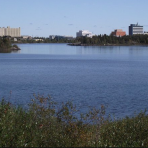Who Killed Frame Lake? A Precautionary Tale for Urban Planners (Water Conversations feat. Tim Patterson)
Who Killed Frame Lake? A Precautionary Tale for Urban Planners (Water Conversations feat. Tim Patterson)
Categories: Lectures and Seminars, Panel Discussions | Intended for Anyone

3235 Mackenzie
1125 Colonel By Dr, Ottawa, ON
Contact Information
Christiane Mineau, (613)520-2600 ext. 2516, christiane.mineau@carleton.ca
Registration
Cost
$0
About this Event
Host Organization: The Global Water Institute
More Information: Please click here for additional details.
The Global Water Institute (GWI) would like to invite you to the fifth installment of Water Conversations, our brown bag lunch series. These are informal talks that aim to introduce water researchers to each other, establish friendships, and help us to better understand the type of water research that Carleton faculty and students are undertaking so that we can collaborate better and successfully team up for larger projects. Please bring your lunch and we will serve the drinks and cookies. Spaces are limited, please RSVP to christiane.mineau@carleton.ca.
Our February speaker is Tim Patterson, paleolimnologist and professor of Earth Sciences at Carleton University.
Abstract: Frame Lake, located within the city of Yellowknife, NWT, has been identified as requiring significant remediation due to its steadily declining water quality. This had resulted in significant loss of Aquatic Ecosystem Services by the early 1970s as by then the lake was no longer able to support fish, and associated changes to the lake ecosystem forced the closure of a once popular swimming beach. This was unfortunate as Frame Lake still serves as an important recreational and meeting area for both tourists and local citizens, with a walking trail extending around the periphery, and with Yellowknife City Hall, the Legislative Assembly of the Northwest Territories, and the Prince of Wales Northern Heritage Center located on its shore. Now shuttered gold mining operations within the city limits (arsenic contamination), and expanding urbanization (nutrification) around the lake were suspected as probable causes for the precipitous decline in water quality, but due to a surprising lack of written documentation, paleolimnological tools had to be deployed to reconstruct hydroecological lake history. In this presentation I will explain, using the example of Frame Lake, how my research group uses high-resolution paleolimnological proxy data to track lake degradation, which provides policy makers and planners with data required to make informed decisions on appropriate remediation and mitigation methods.
Register For this Event
30 spaces capacity, 29 spot(s) left.